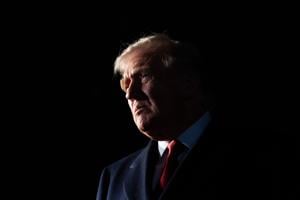World
Trump Celebrates Ceasefire Agreement Between Thailand and Cambodia

U.S. President Donald Trump attended a significant ceremony in Kuala Lumpur on March 5, 2024, where Thailand and Cambodia signed an expanded ceasefire agreement. This pact, prompted by Trump’s earlier threats of economic pressure, aims to halt ongoing skirmishes along their disputed border. Under the terms of the agreement, Thailand will release Cambodian prisoners, while Cambodia will withdraw heavy artillery as part of the initial phase of the deal.
The ceremony marked an important diplomatic moment for both nations. Cambodian Prime Minister Hun Manet described the day as “historic,” while Thai Prime Minister Anutin Charnvirakul emphasized that the agreement lays “the building blocks for a lasting peace.” Observers from the region will monitor the situation to prevent a resurgence of hostilities.
Trump’s participation in this event came shortly after his arrival at the annual summit of the Association of Southeast Asian Nations (ASEAN). The visit serves as an opportunity for him to bolster his reputation as an international dealmaker, particularly as he navigates challenges at home, including a government shutdown and ongoing tariff disputes.
Following his arrival in Malaysia at around 0200 GMT, Trump engaged with local performers, showcasing his characteristic campaign-style enthusiasm. He is expected to sign trade agreements with Malaysia focusing on critical minerals later in the day. The U.S. has been actively seeking to diversify its supply chains away from China, especially in light of the latter’s restrictions on key technology components.
During the summit, Trump aims to engage with various leaders to reinforce the United States’ position in the region. His previous attendance at an ASEAN summit was limited, and this year’s event provides a new platform for him to act as a global peacemaker. The recent escalation of violence between Thailand and Cambodia in July 2023 had resulted in dozens of fatalities and significant displacement, prompting urgent calls for a resolution.
The ceasefire agreement can be attributed, in part, to Trump’s economic leverage. He had previously threatened to withhold trade agreements unless the fighting ceased, a strategy some analysts believe was crucial in prompting both sides to negotiate. Ou Virak, president of Phnom Penh’s Future Forum think tank, remarked, “The fact that Trump was holding the tariff card was actually very, very significant. That’s probably the main reason… why the two sides agreed immediately to the ceasefire.”
In the wake of the agreement, Trump signed separate economic deals with both Thailand and Cambodia, further cementing his role in the diplomatic process. He has actively campaigned for recognition, such as the Nobel Peace Prize, based on his involvement in resolving international conflicts.
Malaysian Prime Minister Anwar Ibrahim praised the ceasefire during his opening remarks at the summit, stating, “It reminds us that reconciliation is not concession, but an act of courage.” Nikorndej Balankura, spokesperson for the Thai foreign ministry, described the agreement as a “joint declaration” that signifies a commitment to renewing relations between the two countries.
As Trump continues his tour in Asia, he is also expected to meet with Brazilian President Luiz Inácio Lula da Silva but has opted not to engage with Canadian Prime Minister Mark Carney, due to ongoing tensions over tariffs. Trump has announced plans to increase tariffs on Canada following a dispute over a television advertisement criticizing his policies.
The president’s agenda also includes a highly anticipated meeting with Chinese leader Xi Jinping in South Korea, where they are expected to discuss various pressing issues, including fentanyl trafficking and soybean sales. Trump expressed optimism regarding the potential for a comprehensive trade deal.
Details surrounding Trump’s agreements remain sparse as he progresses through his trip. Observers will be attentive to whether these negotiations yield substantive resolutions or merely defer long-standing issues. Trump has indicated confidence in finalizing trade agreements with Japan and South Korea, underscoring the strategic importance of these partnerships.
Absent from the summit is Indian Prime Minister Narendra Modi, with whom Trump’s relationship has recently cooled. Tensions have arisen due to Trump’s remarks about mediating conflicts between India and Pakistan and his imposition of tariffs on India for its purchase of Russian oil.
As the events unfold in Kuala Lumpur, the international community will be watching closely to see how these agreements impact regional stability and U.S. relations in Southeast Asia.
-

 Lifestyle3 months ago
Lifestyle3 months agoLibraries Challenge Rising E-Book Costs Amid Growing Demand
-

 Sports3 months ago
Sports3 months agoTyreek Hill Responds to Tua Tagovailoa’s Comments on Team Dynamics
-

 Sports3 months ago
Sports3 months agoLiverpool Secures Agreement to Sign Young Striker Will Wright
-

 Lifestyle3 months ago
Lifestyle3 months agoSave Your Split Tomatoes: Expert Tips for Gardeners
-

 Lifestyle3 months ago
Lifestyle3 months agoPrincess Beatrice’s Daughter Athena Joins Siblings at London Parade
-

 World3 months ago
World3 months agoWinter Storms Lash New South Wales with Snow, Flood Risks
-

 Science3 months ago
Science3 months agoTrump Administration Moves to Repeal Key Climate Regulation
-

 Business3 months ago
Business3 months agoSoFi Technologies Shares Slip 2% Following Insider Stock Sale
-

 Science2 months ago
Science2 months agoSan Francisco Hosts Unique Contest to Identify “Performative Males”
-

 Science3 months ago
Science3 months agoNew Tool Reveals Link Between Horse Coat Condition and Parasites
-

 Sports3 months ago
Sports3 months agoElon Musk Sculpture Travels From Utah to Yosemite National Park
-

 Science3 months ago
Science3 months agoNew Study Confirms Humans Transported Stonehenge Bluestones









